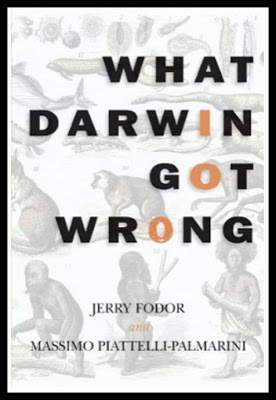
Aristotle, in his Physics argued that there are four causes behind everything that exists. These causes answer the question of "How" or "Why" something is the way it is.
- The Material Cause
- The material from which something is made. E.g. the stone of a statue.
- The Efficient Cause
- The external force that causes something to be made. E.g. the artisan and his tools who make a statue.
- The Formal Cause
- The form or plan of the thing made that define it. E.g. the artisan's written or thought blueprints or sketch of plans for how to make the statue.
- The Final Cause
- The goal and reason of the thing. E.g. the purpose for which the artisan is making the statue.
If the statue lacks any one of the four causes, it will not be made.
The Demise of the Formal and Final Causes
If you want to point your finger at a single philosophical change that defines the shift from the Aristotelean worldview of antiquity and the Middle Ages to the materialism of modernity, it is the rejection of the Formal and Final Causes in the early Enlightenment.
Just ask your modern brain: "Does everything really have a purpose?" You will probably reflexively think back "No," therefore, you do not believe in a Final Cause to everything. The same is true of the Formal Cause, both of them seeming to assume that there is a kind of conscious agency behind the action. That isn't strictly speaking how Aristotle intended them, but that's how they are interpreted through modern goggles.
You can see their rejection as early as the 1600's: Francis Bacon in Novum Organum pushed aside the Final Cause as only being only suitable for inter-human behavior. The Formal Cause, he dismissed merely as desperata "hopeless." He actually dismissed the vocabulary of the other two causes as being superficial and an irrelevant distinction too, but philosophically, they are still retained in his philosophy by other terms.
In any case, modern people do not believe in Final and Formal Causes, or if they do, not for everything in the cosmos. For Aquinas and others in the Aristotelean world, the question of whether the universe has a purpose or a formal plan is a kind of tautology. Of course it does! Everything non-random does in Aristotelianism.
The Final Cause in Nature?
Now our post-materialist view of the Final Cause is sort of different from Aristotle's original view. We have to remember that Aristotle viewed grammar and cognition as something that in some way was directly reflective of reality itself. Compare this view shared with the so-called "Speculative Grammarians" of the Middle Ages, "speculative" coming from the Latin word speculum "mirror", since grammar reflects reality. This common strand stretches from Aristotle to those influenced by his work like Priscian and Bacon (Roger (who was based), not Francis (who was p. cringe)).
Nowadays we atomize questions like "Why" to the point that even causality itself doesn't mean anything and is a mere human cognitive convention, but for Aristotle, the linguistic existence of "Why" questions means that there is a legitimate logical equivalent to "Why" in reality.
Aristotle originally had argued that it is appropriate to refer to the Final Cause of something whenever it is not due to randomness or spontaneity. The example he uses is the growth of human teeth: there is no variance in where the molar and incisors grow within the human mouth. Everything appears where it's "supposed to" and we can assume that there is some kind of Final Cause behind this.
If different shapes and sizes teeth grew in different locations of the mouth, then it would be appropriate to talk of them as lacking a Final Cause. Things that appear randomly and inconsistently do not necessarily have Final Causes, but if something happens invariably, we can trust that it has a Final Cause.
Darwin "Got It Wrong" too?

So how far are moderns willing to take the rejection of the Formal and Final Causes?
One of my old Ph.D. advisors, Massimo Piatelli-Palmarini wrote a book with Jerry Fodor called What Darwin Got Wrong. You can withhold your kneejerk reactions; it's not a creationist book or anything, but it almost ended up being as controversial—it's a critique of Darwinian natural selection on "philosophic" grounds.
I will stultify one of the main arguments for brevity's sake: "How can we reasonably talk about evolution as a goal oriented process when we have admitted already that speaking of Final Causes is illegitimate?" Massimo and Fodor do not use the Aristotelian terms, (instead they talk of Gould's spandrels) but that's what they mean.
Evolution would only have been "scientific" in Medieval Europe.
Darwinian natural selection is actually a kind of cheat idea for materialism. In order to understand how humans have arisen from common descent with other animals, we want to have a narrative of why we speak, why we are bipedal, why our bodies are mostly hairless, etc. etc. Natural selection offers an answer without reference to a conscious incremental designer (God), but it smuggles back in the Final Cause: "This evolved to do that."
But if we actually limit ourselves from talking in purpose-driven/Final-Cause statements, the most communicative "scientific" thing we can say is "Humans share a common ancestor with other animals, but we became different." The issue of "Why" is dreaded "metaphysics." In truth, we actually need a Final Cause to understand anything. The Final Cause, as Aristotle notes, is really the most important cause, because understanding it is key to understanding something in its greater context. Understanding something intuitively largely amounts to knowing its Final Cause. Darwinism came to be accepted as a theory because it cleverly smuggled in illegal metaphysics that we were having withdrawal symptoms for. When you really think about it, this totally withdraws Darwinian selection from the ledger of supposedly scientific topics if you took such standards seriously (I don't).
The funny thing is that people can easily be made to become hyper-material anti-metaphysicians or lax on everything depending on circumstances. Fodor and Massimo partially wrote their book as a critic of "adaptationism" and evolutionary psychology, which were and still are bugaboos to the political left because they seek to explain minutiae of human social life, including hot-button issues like gender differences and race, in the light of Darwinian natural selection. Leftists like Gould and Lewontin would dismiss such explanations as "just-so stories," as would science-popularizers and the press, but Fodor and Massimo argue that this is an argument you cannot avoid generalizing once you make it. It applies to all of evolution: if it is philosophically illegitimate to talk about human sexual dimorphism because that reads a Final Causes into evolution, then it is equally illegitimate to talk about any other kind of change as being purpose driven by "selection."
This book was received with mostly hostile confusion by the mainstream press and I suspect most biologists which mostly missed the argument and were languishing in the culture wars of the Bush Years. Mind you, I don't agree with the book, but it's mostly because I don't care to endorse this kind of materialism, but most people do indeed at least claim to abide by it, so these arguments would be important to address for them.
Just a "linguistic" argument?
At the end of it, any evolutionary biologist will be tempted to throw up their hands and say "So what‽" to that philosophical objection. After all, it sure feels like some kind of technicality or argument from the way we linguistically talk about evolution. And they're right! In truth, Darwinian evolution is a useful theory specifically because it is a method of giving us a Final Cause for gradual evolutionary changes. That's the whole point afterall. If it didn't give us a Final Cause, it wouldn't be an explanation. Striking the Formal Cause from scientific vocabulary is only a recipe for the typical postivistic science status quo of denying any "metaphysics" to your science while just tacitly assuming it all.
Return of the Formal Cause?

What about the Formal Cause? That is, what about the idea that everything must have a form/plan behind its creation? If we are willing to concede that a Final Cause can arise from natural selection, what about a Formal Cause?
While I'm on Fodor and Massimo's book (who again, are not talking in Aristotelian terms themselves), they actually do end up resuscitating the Formal Cause as well, albeit in a more purposeful way. While the book beats around the bush, I can say that in my conversations with Massimo at Arizona, he really does think of evolution as not being an issue of natural selection. Instead he (and Noam Chomsky as well) has the view that complex features in biology evolve from in-built genetic parameters whose complex interactions can also produce fully-formed design. This is the kernel of Minimalism in linguistics.
Now in presentations, Massimo always loves to talk about those species of jellyfish which with a single simple genetic change, develop highly complicated proto-eyes even without a direct need. One minor genetic development can produce structure as complicated as a primitive eye. This is not uncommon in biology because many complex structures are simple derivatives of simple principles. The general name for this is emergent properties and are said to be based on so-called Laws of Form.
Laws of Form are actually a big topic of conversation in linguistics nowadays, Chomsky's idea approaching the idea that one single and very simple cognitive change could be enough to produce the human language faculty. (This is totally contrary to the pop-idea of language abilities slowly arising from behavioristic cave-man grunting complexifying over centuries).
It should be obvious that Laws of Form, Fibonacci spirals, golden ratios, apparent ordering and other emergent properties arise naturally from the universe without the obvious need of conscious planning. This is not a rejection of the Formal Cause, but states the truth that it is universal. "Form" needn't just be a conscious plan like the sculptor's plan for a hunk of marble, but a form that emerges from natural principles.
Even a Materialistic Universe Generates Formal and Final Causes
In trying to escape the Formal and Final Causes, modern science has really made them more irreplaceable. Laws of Form emerge from very simple computational operations and define the formal structure of things that arise in nature. At the same time, any kind of selective pressure or survival mechanism like Darwinian selection will naturally produce structure arranged to a goal. Understanding anything is quite impossible without referring to its Formal and Final Causes.
For the Aristotelian up until Newton (the last of the magicians in J.M. Keynes' terms), this is us uncovering the Mind of God. While words like "God" make moderns queasy, it's legitimate to ask why the Formal and Final Causes as concepts should. Final Causes are by definition universal where unchecked spontaneity occurs. A conscious human mind is not a prerequisite for them, neither for Formal Causes.
You actually can keep even a very clumsy materialism while accepting these traditional notions. Indeed, to understand something's Final and Formal Causes is to truly understand it such that the Material and Efficient Causes seem like mere details.